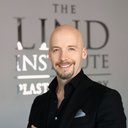Thank you very much for your question. In this day and age we have so many products and services (surgical and non-surgical) to treat so many different things that it can all get a bit confusing. No, the Halo laser is not for treating nasolabial folds. The Halo laser is for treating fine lines and wrinkles, large pore size, poor skin texture, uneven skin tone, sunspots, and poor skin complexion. It does a tremendous job with those issues and the patients in my practice have been thrilled with their results and the lack of significant downtime after the procedure. To treat nasolabial folds, we typically use soft tissue fillers (Restylane, Juvederm, etc) to add volume to the cheeks/midface area and to the nasolabial fold area to soften the folds. I hope this clears it up for you. Thanks again and best of luck to you.


